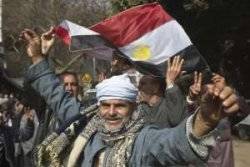Polls have closed in a two-day referendum on Egypt’s new constitution, the first ballot since the army overthrew President Mohamed Morsi on July 3.
If the charter is approved, as it almost certainly will be, it will replace a 2012 constitution drafted during Morsi’s short-lived presidency.
In interviews at polling stations across the Egyptian capital, Cairo, on Tuesday and Wednesday, not a single person said they planned to vote against the document.
The army-backed interim government needs high turnout to demonstrate that it has 'popular support'. State radio said that 28 percent of voters participated in the first day of voting, a claim that is hard to gauge: Voters said the lines were shorter than during the 2012 referendum, but there were also more than twice as many polling stations, which should result in shorter queues.
Visits to polling stations suggest that second-day turnout would be lower. A queue in the upscale Zamalek district that stretched for two blocks on Tuesday had just four voters on Wednesday afternoon.
"We need to turn the page on the Muslim Brotherhood," said Bassim Guirguis, a pharmacist leaving the polls. "Egypt can’t survive another year like the one that just passed."
The Brotherhood’s Freedom and Justice Party, meanwhile, made the oddly precise and highly implausible claim that 91.7 percent of voters were boycotting the referendum. The party suggested that most of the people voting were Christians, stepping up a sectarian campaign that has long blamed Egypt’s Coptic minority for Morsi’s ouster.
The state-run National Council for Human Rights said it had received more than 200 complaints, many of them concerning polling stations that opened late, or election observers who were barred from entering. But there were no widespread reports of irregularities.
There were also no reports of violence on Wednesday. At least 11 people were killed in clashes across the country on Tuesday, and a bomb damaged a courthouse in Cairo’s Imbaba neighborhood two hours before polls opened.
Police arrested one man in Cairo for writing "no to military trials" on his ballot. The new constitution, like its predecessor, allows the military to prosecute civilians for attacks on army personnel or institutions.
Final results will be announced within 72 hours, according to the high electoral commission.
PHOTO CAPTION
Egyptians wave their national flag and shout slogans in support of Egypt's army chief Abdel Fattah al-Sisi as others queue outside a polling station on January 15, 2014 in Cairo.
Aljazeera


 Home
Home Discover Islam
Discover Islam Quran Recitations
Quran Recitations Lectures
Lectures
 Fatwa
Fatwa Articles
Articles Fiqh
Fiqh E-Books
E-Books Boys & Girls
Boys & Girls  Articles
Articles










